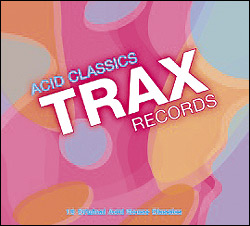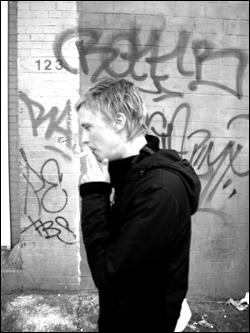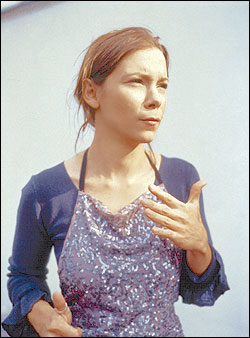It seems odd to suggest the music that kick-started “dance music” as we know it needs to be rediscovered. But the eternal presence and currency of techno, and especially house, make it easy to overlook the specificity and uniqueness of their original formulation. For contemporary house fans, long tired of filter-disco’s relentless cheerfulness and electroclash’s rawk attitude, the stripped-back menace, brazen sexuality, and raft of simple but devastating sonic tricks of early Chicago house can be revelatory.
It’s hard to imagine a better time for Trax Records—the first Chicago house label, responsible for an overwhelming amount of the scene’s seminal moments—to release a retrospective series. Trax Records 20th Anniversary Collection (Trax/Casablanca) is one disc of stand-alone songs and two respectfully mixed sets from Maurice Joshua and Paul Johnson, featuring productions from almost all of the scene’s leading lights: Marshall Jefferson, Phuture, Adonis, and Frankie Knuckles; there’s also Acid Classics, a single disc devoted solely to acid house, and Trax Records: The Next Generation, a two-disc set of contemporary releases.
It’s arguable that what distinguishes Trax Records from subsequent labels like Strictly Rhythm is its relative distance from current American house music, which leaves even well-known anthems like Farley Jackmaster Funk’s “Love Can’t Turn Around” sounding a little like “lost” treasures. With its rudimentary thumping beats, prickly sonics, and deranged, overblown vocalists, this music is frequently irreconcilable with the lush, full-bodied gentility that we normally associate with house. Unsurprisingly, the frequently excellent inclusions on The Next Generation—a mixture of recent tracks by back-in-the-day scenesters like Screaming Rachael (now Trax Records’ president) or Joe Smooth, and younger Chicago producers like Paul Johnson and DJ Sneak—bear only superficial similarities to their Chicago ancestors, slotting more comfortably into the New York lineage of slick diva-house, bumping garage, and swirly disco homages that have defined American house for the last decade and a half.
There’s nothing wrong with this lineage, exactly, but it marginalized the mania and astonishing, frequently counterintuitive creativity that defined house’s first wave in favor of a conservative emphasis on house as building on the disco tradition. In a sense, this conservatism is really perfectionism, homing in on the concept of sensuality in repetition that spans the disco/house divide. But retrospect makes it difficult not to side decisively with the quirky restlessness evident on Acid Classics and 20th Anniversary Collection. This is the work of producers obsessed with finding different ways to make you move.
It’s tempting to suggest that house has always been most exciting when it does away with the songfulness it inherited from disco. As 20th Anniversary demonstrates, the truth is a bit more complicated: The best Chicago house imperceptibly intertwines “track” (sound for sound’s sake, weirdness galore) with “song” (“This could be on the radio”) in a symbiotic relationship. Much of its spark and strangeness comes from the producers’ struggle to mediate the divide. Frankie Knuckles and Jamie Principle’s “Baby Wants to Ride” is simultaneously song and track, the percolating electronic beeps and woozy synth chords commandeering the body with their slivering slinkiness; at the same time, it reflects the oppressive sleaze and joy through submission of Principle’s camp spoken-word performance. Not tuneful in any conventional sense, the track nonetheless abounds with both hooks and personality. Even better is the same duo’s “Your Love,” a stunningly beautiful transmutation of symphonic disco and art pop through house’s organizing principles: scintillating electronic percussion, hypnotic loops, and astonishing operatic backing vocals.
Perhaps Chicago house really was disco for aliens. With its dreamy keyboards and mournful flute solo, Jungle Wonz’s “The Jungle” feels like the elegy for a disappeared underwater civilization, or an arcane religious rite witnessed in a dream. Similarly exotic but more paranoid, Master C & J’s “Dub Love” uses miasmic synthesizers and an ominous male vocal to evoke a sense of dangerous sexual hysteria.
With its instantly recognizable electro squiggle—the product of the Roland TB-303 bass-line synthesizer—and profoundly antihumanist feel, acid house might form the most distinct and distinguished plank of Trax’s legacy, but Acid Classics somehow manages to be more daunting than the sprawling largesse of 20th Anniversary. Acid‘s corrosive 303 smears are like sulfurous bubbles breaking the surface of the groove, while each is individually fascinating; these rigorously minimal exercises in instrumental menace can occasionally leave you gasping for a diva or synth hook to let some light in. As with early Detroit techno, the monochrome misanthropy of tracks like Farley Jackmaster Funk’s “This Acid Life” is redeemed by the music’s engrossing, hall-of-mirrors spaciousness, with producers wringing out every conceivable variation from a limited inventory of motifs and effects. Acid is immediately physical, its pummeling 4/4 beat retaining a final, flickering fragment of disco’s seductive sensuality, an invisible imprint hidden within the music’s genetic code.
Because the 303’s sound is so evocative and mysterious, its pared-down application on the tracks here can seem excessively formalistic. Pierre’s Pfantasy Club’s melodic vocal track “Got the Bug” is one of a handful to break the holding pattern, its overlapping acid squalls underpinning a deceptively tuneful and increasingly disturbing paean to obsession and addiction. But “Got the Bug” also shows the best acid house marking not so much a radical break with house, or even disco, but an intensification of its already radical qualities.






